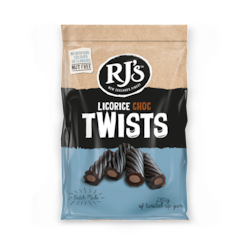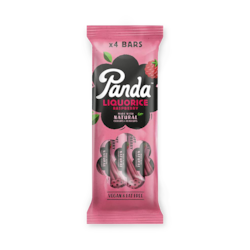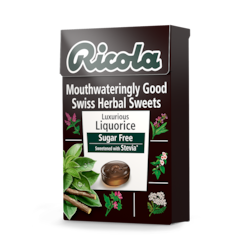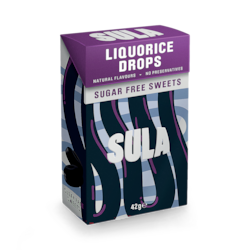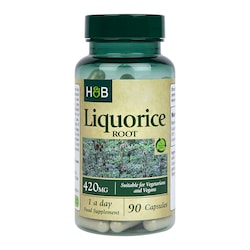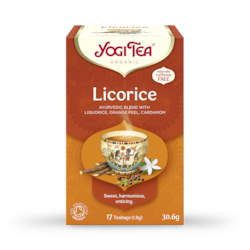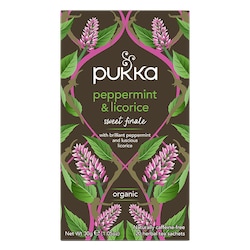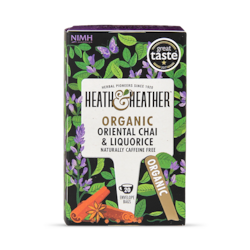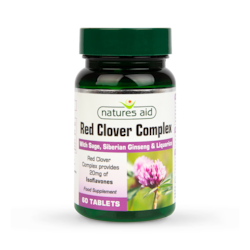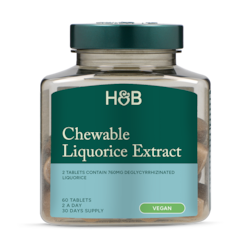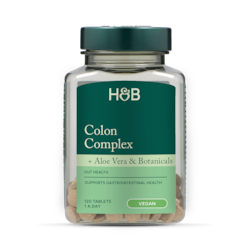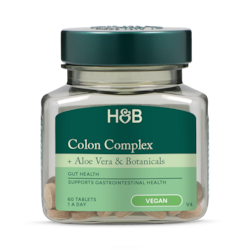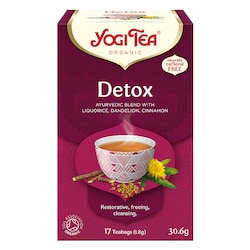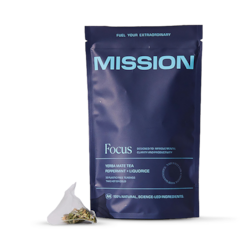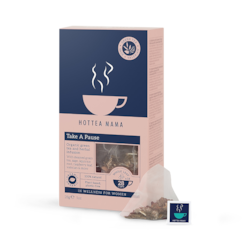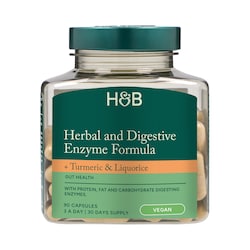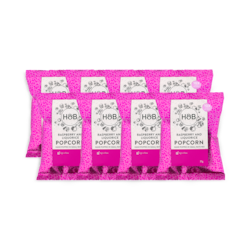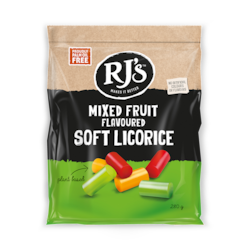20% off £30
Code:TREAT
Liquorice: benefits, dosage, side-effects & supplements

Liquorice sweets might come to mind but liquorice root is also one of the world's oldest herbal medicines. Here are its health benefits.
Summary
1Is liquorice good for you?
Liquorice is thought to have antimicrobial as well as other properties, and most of this is down to its active ingredient.
28 health benefits of liquorice
There are many liquorice benefits, ranging from helping to soothe a sore throat to settling an upset stomach. Here are 8 health benefits liquorice...
3What are the side-effects of taking liquorice?
Side-effects of low-potassium levels can include lethargy and abnormal heart rhythms. It’s thought liquorice’s side-effects are caused by the...
You may think of liquorice first and foremost as a sweet, in ‘allsorts’ of shapes and sizes, but it’s also been used traditionally for thousands of years.
Due to its natural sweet taste, you will often find it in soft drinks, snacks, food products and herbal medicines.
However, some liquorice-flavour sweets (mainly those in America) don’t actually contain any extract from the liquorice plant at all.1 A popular alternative is anise oil, which smells and tastes just like liquorice.
Summary
- Liquorice is not just a sweet, it has been used by many cultures for many years
- It can also be used to sweeten everyday products, like soft drinks

What is liquorice?
Liquorice comes from the root of a plant called glycyrrhiza glabra.2 The root extract has a sweet flavour, and contains over 300 different active compounds.3 Studies show that liquorice may be effective for a number of conditions, including indigestion, hot flushes and low blood pressure.
Is liquorice good for you?
Liquorice is thought to have antimicrobial as well as other properties, and most of this is down to its active ingredient.4,5,6
Licorice or liquorice?
Licorice is the American English spelling of liquorice, which is British English.
Is liquorice fattening?
If you are eating liquorice, it can sometimes be mixed with extra sugar and other calories. You should treat it as any normal sweet if you are eating it like this.
However, some liquorice products like liquorice tea and liquorice root extract tablets will definitely not be fattening.

Are liquorice sweets good for you?
Liquorice could be a healthier choice than pure-sugar sweets - if you like the unique taste. However, it does depend on what else has been added into the mix, e.g. added sugar and other flavours.
Summary
- Liquorice comes from a plant and has multiple health benefits
- The main thing to pay attention to when it comes to liquorice products and supplements is if it actually contains real liquorice root extract
8 health benefits of liquorice
There are many liquorice benefits, ranging from helping to soothe a sore throat to settling an upset stomach. Here are 8 health benefits liquorice has to offer.
What does liquorice do in the body?
Liquorice is thought to have antimicrobial properties.7,8,9
But, is liquorice good for you? Research shows it may be helpful for a number of conditions, such as:
Digestive issues can show up in multiple different ways, like acid reflux, heartburn, indigestion, and an upset stomach. Some people believe that liquorice root extract can help ease these digestive discomforts.
A 2011 study, published in Evidence-Based Complementary and Alternative Medicine, looked at people with indigestion taking 75mg liquorice root extract twice a day for 30 days.
After two weeks, patients said many of their symptoms had significantly improved, including upper abdominal fullness, bloating, regurgitation and loss of appetite.10
Another 8-week study was conducted on 58 adults with gastroesophageal reflux disease (GERD), which has symptoms like heartburn and acid reflux.
The results showed that a low dose of glycyrrhetinic acid (from liquorice) in combination with normal treatment resulted in positive symptom improvements.11
Liquorice has been found to help with stomach problems related to the H.pylori bacteria, which is a common cause of peptic ulcers. This type of ulcers can develop in your small intestine, lower esophagus or stomach.
A 2016 study published in The Brazilian Journal of Infectious Diseases found that adding liquorice extract to a conventional medication for H.pylori could help eradicate the bacteria more effectively.12
You may have already seen liquorice or liquorice root extract in the ingredients of some teas, especially those that claim to ‘soothe’ the throat.
Liquorice has traditionally been used to soothe a sore throat,13 and now there’s some evidence to back this up.
In a small 2016 Egyptian study, scientists gave either liquorice or a conventional medication gargle to people before an operation. After a procedure, when the breathing tube is removed, many patients can experience a post-operative sore throat.
But the results of this study showed the liquorice gargle was just as effective as the conventional gargle.14
Liquorice root extract may help to protect our teeth from bacteria that can cause cavities.
Laboratory research has shown liquorice has the potential to kill bacteria linked with dental decay, while a 2008 study by the University of Washington found a liquorice-infused patch placed in the mouth could soothe mouth ulcers.15,16
Another 3-week study on small children who were given sugar-free lollipops that contained 15mg of liquorice root twice a day during the school week.
The results showed that the lollipops appeared to help reduce the cavity-causing bacteria Streptococcus mutans.17
In a 2012 study published in the Iranian Journal of Pharmacological Research, researchers found menopausal women with hot flushes who took 330mg of liquorice root extract three times a day, reported a reduction in the frequency and severity of their flushes.18
Liquorice root is known for its antibacterial effects.
A 2010 study by Shahid Beheshti University, Iran, found an extract of the leaves and root helped fight skin infections caused by the staphylococcus aureus bacteria, such as impetigo.19
Another 2-week study found that adults with eczema who applied a topical gel containing liquorice root extract found their eczema significantly improved.20
Hepatitis C is a virus that infects the liver, and if left untreated, can cause inflammation as well as long-term liver damage.
Researchers have found that the active ingredient glycyrrhizin in liquorice root extract could help treat it in the future.21
Even now, doctors in Japan use an injectable glycyrrhizin to manage people with chronic hepatitis that has not responded to normal treatments.22
Some people simply love the taste of liquorice – especially those who love a good old-fashioned sweet shop!
Its rich, bitter and sweet flavour is quite similar to fennel and anise and can be found in Vietnamese dishes as well as in the sweet aisle.
- From helping to soothe a sick stomach to helping keep your dentist happy, liquorice root extract has multiple benefits
Benefits of liquorice tea
Now you know about the benefits of liquorice, but what about the benefits of drinking a warm cup of liquorice tea?
Liquorice tea is also made from the root of the liquorice plant.
Liquorice tea has been used traditionally to help ease digestive problems and nausea, as well as soothe an upset stomach.
As it has antibacterial properties, consuming liquorice root as a tea could give you more than one benefit.

Summary
- Liquorice tea can work in 2 ways to tackle a sore throat or digestive issue.
- First, it’s warmness will physically soothe the body and then it’s unique properties can get to work in the body once digested
How much liquorice is safe to take?
There are currently no guidelines for safe intake levels of liquorice, but both the World Health Organisation and the European Commission Scientific Committee on Food recommend no more than 100mg a day of glycyrrhizic acid – a potentially toxic compound found in liquorice – a day for the average adult.23,24
Too much liquorice can cause a drop in potassium levels in your body, which may lead to high blood pressure.25
If you have a history of heart problems or high blood pressure, speak to your GP if you’re thinking of trying a liquorice supplement.26 And always talk to your doctor if you’re on any medication, as liquorice can interact with some drugs such as warfarin or hormone replacement therapy.27
Avoid taking a liquorice supplement during pregnancy as it can harm an unborn baby’s brain.28
Experts don’t know the safe levels of liquorice for breast-feeding women or children, so it’s always best to speak to your GP or a qualified medical herbalist before taking supplements.29
Summary
- There are no current official guidance for what dosage of liquorice is considered safe
- However, WHO and ECSCF recommend an average adult should not consume more than 100mg a day
- Too much liquorice can lead to high blood pressure
- Those on any medication should consult their Dr before taking liquorice supplements
- Pregnant and breastfeeding women and children should avoid liquorice
What are the side-effects of taking liquorice?
Side-effects of low-potassium levels can include lethargy and abnormal heart rhythms. It’s thought liquorice’s side-effects are caused by the glycyrrhizic acid, but it is possible to buy deglycyrrhizinated liquorice (DGL), which may help prevent these issues.30

Liquorice supplements
There are a few different ways to experience the benefits of liquorice, including some supplements. Here are a few of the most common:
Choosing to take your liquorice in capsule or tablet form is quick, easy and tasteless – which some people will be very thankful for!
Look out for ones that have high-quality, real liquorice inside and haven’t got unnecessary ‘filler’ ingredients.
Like to keep everything au natural? You’ll be pleased to know you can buy sticks of pure liquorice root to cook with, bake with and even chew on to freshen up your breath!
Use it in Asian-inspired noodle dishes, apple cakes, ice-cream, and more.
Liquorice lozenges or a liquorice gargle are sometimes recommended to those who are going to have surgery.
This is because a small number of studies suggest that it can help to prevent or lessen the severity of post-surgery sore throat.31
You can buy pre-made liquorice tea leaves and tea bags. They usually come blended with other tea leaves and flavours like peppermint, orange peel and chai.
Liquorice teas can help soothe a sore throat.
How to make your own liquorice tea
- Slice up your liquorice root so you can measure it by tablespoon.
- Take one tablespoon of liquorice root for every 250ml of water (per person for a normal sized cup of tea)
- If you are making the tea to help soothe a cough or sore throat, try adding a couple slices of fresh ginger and a stick of cinnamon. You wont have to add any sweeteners, liquorice is plenty sweet enough!
- Bring the whole pot to the boil and allow it to simmer for about 10 minutes.
- Take off the heat and allow to rest for 5 minutes before serving.
- Use a strainer or teapot with strainer to serve and catch all those bits – and enjoy!
- https://www.medicalnewstoday.com/articles/323761
- https://www.sciencedirect.com/topics/pharmacology-toxicology-and-pharmaceutical-science/liquorice
- https://www.medicalnewstoday.com/articles/323761
- https://www.ncbi.nlm.nih.gov/pmc/articles/PMC4629407/
- https://pubmed.ncbi.nlm.nih.gov/25737160/
- https://www.ncbi.nlm.nih.gov/pmc/articles/PMC7012004/
- https://www.ncbi.nlm.nih.gov/pmc/articles/PMC4629407/
- https://pubmed.ncbi.nlm.nih.gov/25737160/
- https://www.ncbi.nlm.nih.gov/pmc/articles/PMC7012004/
- https://www.ncbi.nlm.nih.gov/pmc/articles/PMC3123991/
- https://www.ncbi.nlm.nih.gov/pmc/articles/PMC3615700/
- https://www.sciencedirect.com/science/article/pii/S1413867016301696#!
- https://www.medicalnewstoday.com/articles/323761
- http://ejca.eg.net/article.asp?issn=1687-9090;year=2016;volume=10;issue=3;spage=45;epage=49;aulast=Ibrahim
- https://pubs.acs.org/doi/10.1021/np2004775
- https://www.ncbi.nlm.nih.gov/pubmed/18348383
- https://pubmed.ncbi.nlm.nih.gov/21108917/
- https://www.ncbi.nlm.nih.gov/pmc/articles/PMC3832176/
- https://www.ncbi.nlm.nih.gov/pmc/articles/PMC3870067/
- https://pubmed.ncbi.nlm.nih.gov/14522625/
- https://www.ncbi.nlm.nih.gov/pmc/articles/PMC3715454/
- https://www.pnas.org/content/105/37/14204
- https://www.who.int/ipcs/publications/jecfa/en/summary_final.pdf?ua=1
- https://ec.europa.eu/food/sites/food/files/safety/docs/fs_food-improvement-agents_flavourings-out186.pdf
- https://www.medicalnewstoday.com/articles/323761
- https://www.nhs.uk/common-health-questions/food-and-diet/can-eating-too-much-black-liquorice-be-bad-for-you/
- https://www.rxlist.com/licorice/supplements.htm#Dosing
- https://academic.oup.com/aje/article/170/9/1137/165310
- http://www.womenscenteroftexas.com/resources/infant.aspx?chunkiid=21674
- https://www.medicalnewstoday.com/articles/323761
- https://www.nccih.nih.gov/health/licorice-root
- https://www.nccih.nih.gov/health/licorice-root
The advice in this article is for information only and should not replace medical care. Please check with your GP or healthcare professional before trying any supplements, treatments or remedies. Food supplements must not be used as a substitute for a varied and balanced diet and a healthy lifestyle.
Last updated: 7 June 2021


